Managing vacation rentals can get overwhelming fast. Endless guest messages, booking confirmations, and pricing updates eat up hours every day.
Property managers often get trapped in repetitive tasks. That leaves little time for growing the business or making guests happy.
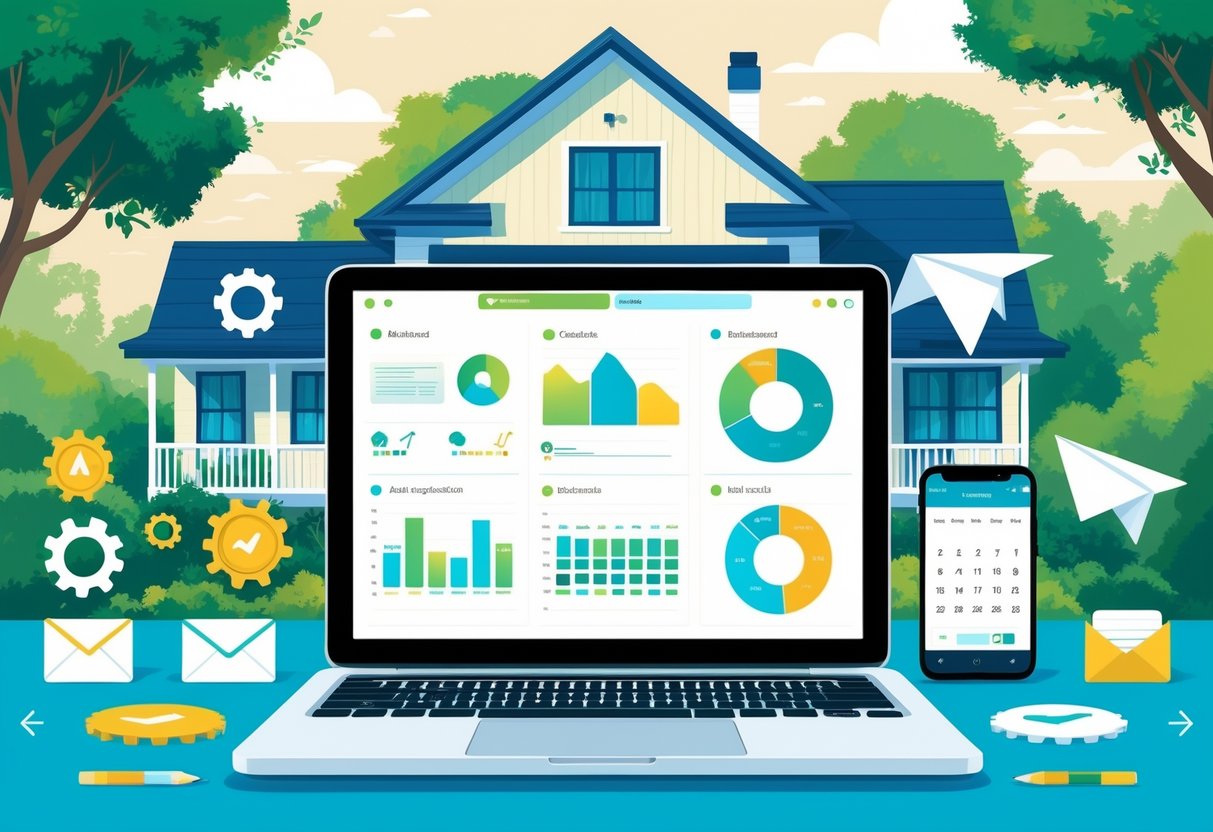
Marketing automation tools for vacation rentals streamline guest communication, manage direct bookings, optimize pricing strategies and enhance brand visibility without manual intervention. These systems turn time-consuming activities like email campaigns and review management into efficient processes that run 24/7.
Properties that use automation tools see big jumps in direct bookings. They also rely less on commission-heavy platforms.
Automation eliminates repetitive tasks that waste valuable time. Owners can scale up without piling on more work.
Key Takeaways
- Marketing automation tools cut out manual guest messaging and email campaigns, boosting direct bookings.
- Property managers free up hours every week by automating communication and pricing.
- Automated systems keep guest messaging consistent and responses fast.
Core Concepts of Vacation Rental Marketing Automation
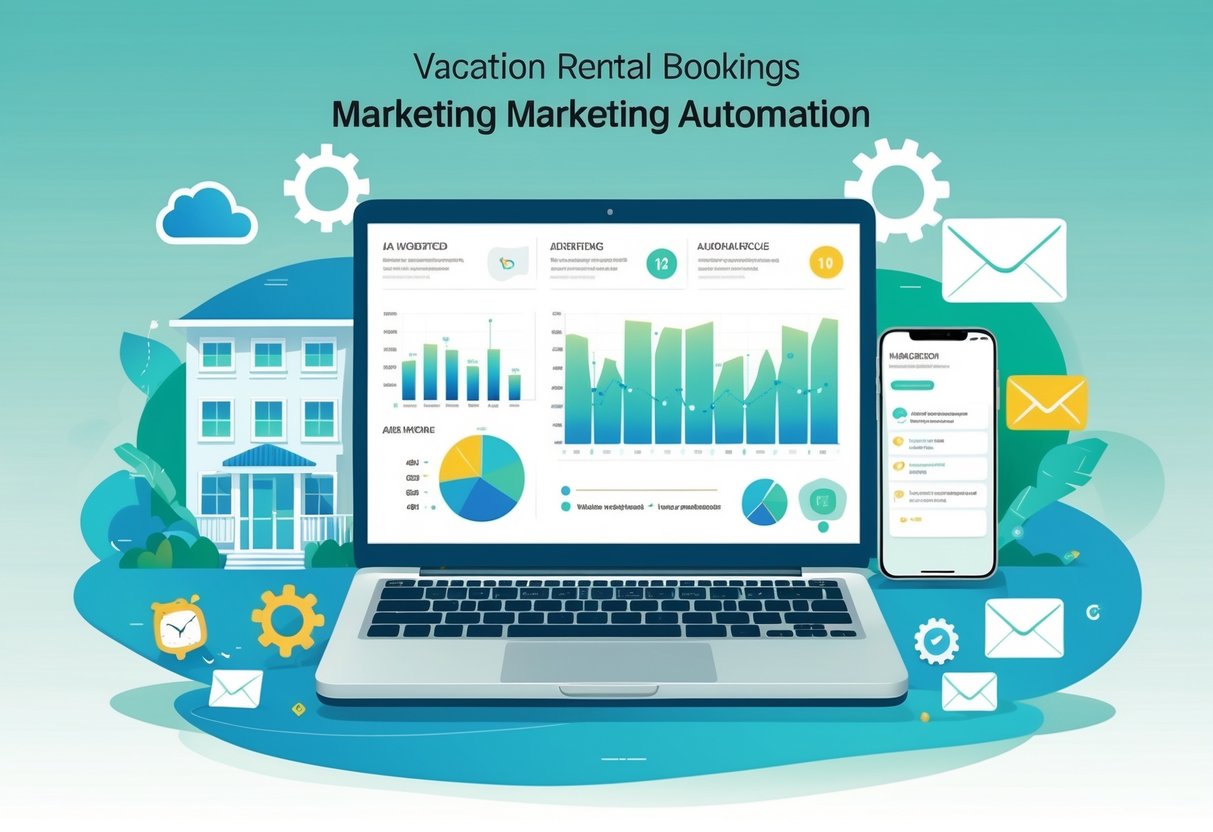
Vacation rental marketing automation makes repetitive tasks like guest messaging, email campaigns, and review management much more efficient. Property managers use these systems to boost direct bookings and save time.
They also help create better guest experiences across their short-term rental business.
Defining Vacation Rental Marketing Automation
Vacation rental marketing automation means using software to handle guest communication, booking optimization, and promotions without constant manual effort. These tools focus on revenue and guest engagement, not just basic property management.
Key automation categories include:
- Guest Communication: Pre-arrival info, support during the stay, and post-checkout follow-ups.
- Direct Booking Optimization: Website chatbots, abandoned cart recovery, booking funnel tweaks.
- Email Marketing: Segmented blasts, seasonal deals, and targeting repeat guests.
- Review Management: Automated feedback requests and organizing responses across sites.
Modern automation connects with property management systems for smooth workflows. Data flows between booking platforms, guest databases, and communication channels automatically.
The technology sends messages triggered by specific booking events. For example, it’ll send check-in details a day before arrival or ask for reviews a few days after checkout.
Benefits for Property Managers and Hosts
Property managers save a ton of time by automating marketing tasks. Comprehensive automation tools let managers focus on business growth instead of getting bogged down in guest communication.
Direct booking rates go up a lot when properties use automation. These bookings skip commission fees from OTAs, which means higher profits.
Revenue grows with dynamic pricing automation and targeted upsells. Automated systems tweak rates based on the market and find chances to offer extra services to guests.
Guest satisfaction improves thanks to consistent, timely communication. Automated systems make sure guests never get delayed responses or miss important info.
Time savings usually look like:
- 10-15 hours per week on guest messaging
- 5-8 hours monthly on email campaigns
- 3-5 hours weekly on review requests and replies
As portfolios grow, automation becomes even more important. It handles more guests without needing more staff.
Common Challenges and How Automation Solves Them
Manual guest communication creates inconsistent experiences. That can hurt your reputation and booking rates.
Property managers struggle to keep up with every inquiry, especially with multiple properties.
Challenge: Time-consuming repetitive tasks
Automation takes over booking confirmations, check-in instructions, and follow-ups. The system sends these instantly, triggered by bookings.
Challenge: Missed upselling opportunities
Automated systems spot and offer relevant add-ons at just the right time. That means more revenue per booking—no extra effort required.
Challenge: Inconsistent review solicitation
Properties often forget to ask for reviews or ask at the wrong time. Automation sends requests when guest satisfaction is highest.
Relying too much on booking platforms cuts into profits and limits direct guest relationships. Marketing automation tools bring more guests to your website and help you capture direct bookings.
Poor data organization makes it tough to target guests with the right marketing. Integrated automation platforms keep guest info and booking history in one place for personalized campaigns.
Key Automation Tools and Software for Vacation Rentals
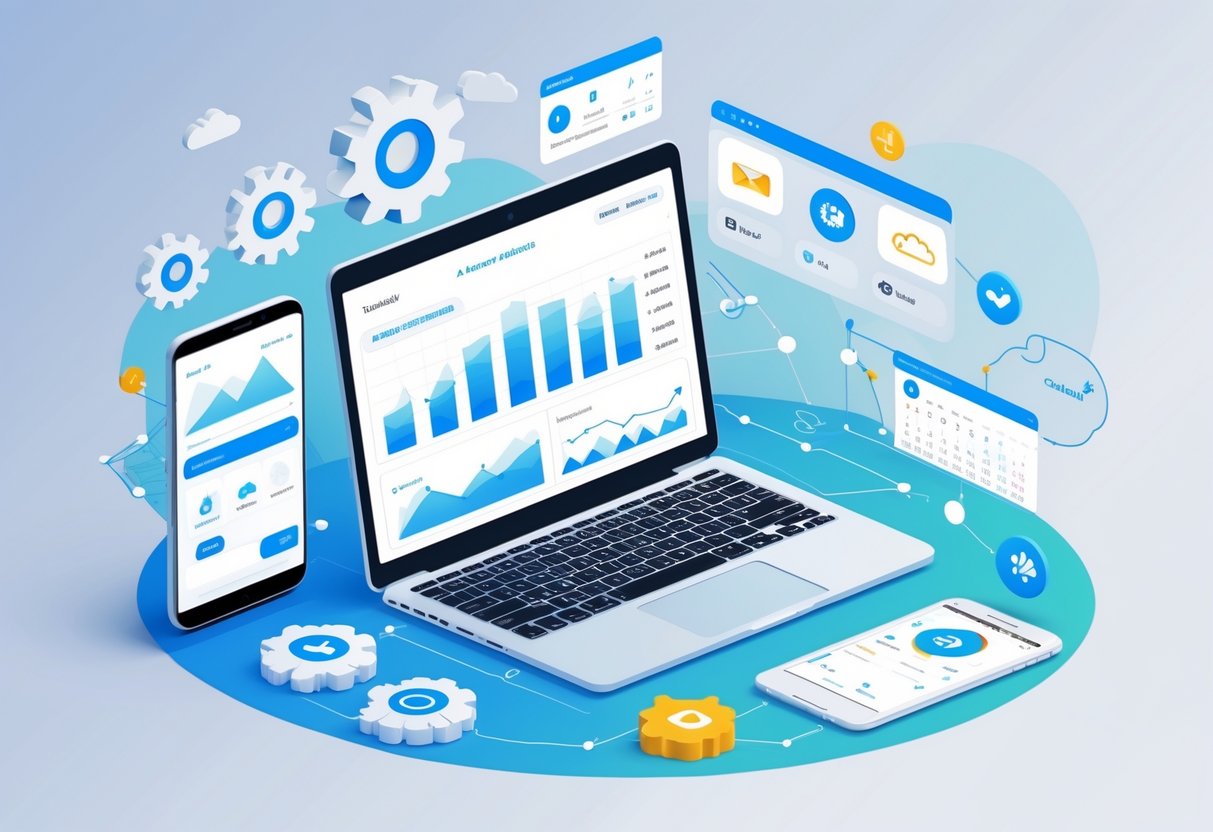
Modern vacation rental businesses run on specialized software. These automation tools streamline operations, cut down on manual work, and improve guest experiences.
Property Management Systems (PMS)
Property management systems are the control center for vacation rentals. They handle bookings, guest communication, and finances all in one spot.
Hostaway offers PMS features with 200+ integrations. It manages reservations, automates guest messages, and connects with major booking channels.
Guesty brings enterprise-level features like a unified inbox, automated workflows, and detailed reports. It’s designed for bigger portfolios.
Hospitable targets smaller operators and individual hosts. It automates guest communication, scheduling, and basic tasks without getting too complicated.
Most PMS platforms include:
- Automated guest messaging
- Booking calendar sync
- Financial tracking and reports
- Maintenance management
- Guest screening
Pick your PMS based on how many properties you have and what features you really need.
Channel Management and Channel Managers
Channel managers put your listings on multiple booking platforms automatically. They sync availability in real-time to prevent double bookings.
Hostaway’s channel manager connects to 100+ booking platforms. When someone books, it updates rates and availability everywhere right away.
Guesty’s distribution network covers major OTAs and direct booking options. The platform manages your listing content, photos, and descriptions across all channels.
Key channel manager benefits:
| Feature | Benefit |
|---|---|
| Real-time sync | Prevents double bookings |
| Rate distribution | Keeps prices consistent |
| Content management | Updates listings automatically |
| Performance tracking | Monitors channel effectiveness |
Most vacation rental automation tools now offer channel management. You don’t need separate systems anymore.
Dynamic Pricing and Revenue Management Solutions
Dynamic pricing tools change your rates automatically based on market conditions. They look at demand, competitor prices, and local events to help you earn more.
PriceLabs uses machine learning to set the best rates. It factors in seasonal trends, local happenings, and what your competitors charge.
Beyond Pricing offers automated rate changes with manual overrides if you want more control. You can set your own rules but still get smart suggestions.
Wheelhouse analyzes similar properties and local demand to recommend competitive rates.
These tools can bump your revenue by 10-25% compared to fixed pricing. They work best when you connect them directly to your PMS.
Task and Operations Automation Platforms
Operations automation handles cleaning, maintenance, and guest services. These platforms create workflows that trigger based on bookings and guest activities.
Breezeway focuses on task management and quality checks. It generates cleaning and maintenance checklists for staff after checkouts.
Turno coordinates turnovers between cleaners and maintenance. It automates scheduling and keeps everyone updated on property readiness.
Your Porter App helps with guest services. It manages concierge requests, sends local tips, and coordinates with service providers.
These platforms cut down on operational headaches. They keep service quality high and reduce the need for constant back-and-forth with your team.
Automating Guest Communication and Experience
Smart automation is changing how vacation rental owners talk to guests. AI-powered messaging, digital guidebooks, and contactless check-in all cut down on manual work.
They also make the whole guest experience smoother, from booking to checkout.
AI-Powered Chatbots and Automated Messages
AI chatbots answer guest questions instantly—stuff like Wi-Fi passwords, checkout times, and local attractions. They work 24/7, so guests get help even if you’re asleep.
Automated guest messaging systems send personalized messages at key moments. Pre-arrival messages cover check-in and property details. Mid-stay messages check in on guest comfort.
Smart templates pull in guest names, arrival dates, and addresses to personalize messages. This keeps things friendly and saves time.
Modern platforms even detect language preferences on their own. Messages switch to the right language and currency automatically, which makes things easier for international guests.
Digital Guidebooks and Real-Time Alerts
Digital guidebooks swap out printed folders for interactive, mobile-friendly guides. Guests access everything—property info, local tips, emergency contacts—on their phones or tablets.
These guides update automatically. If bad weather rolls in, the guide might suggest indoor activities. On sunny days, it recommends the beach.
Real-time alerts keep guests in the loop about maintenance, local events, or weather warnings. Managers send updates straight to guests’ devices.
Key digital guidebook features:
- Interactive maps with local spots
- Restaurant picks with current hours
- Emergency contacts
- House rules and instructions
- Local events and weather updates
Self-Check-In and Smart Locks
Self-check-in means no more waiting around for key handoffs. Guests get access codes or digital keys ahead of time and can arrive whenever they want.
Smart locks from companies like Schlage connect with your PMS. They generate unique codes for each stay, activating at check-in and expiring after checkout.
Enso Connect and similar platforms sync smart lock access with booking systems. Guest access lines up perfectly with reservation dates, and managers can watch entry logs remotely.
Smart lock perks:
- Auto-generated codes for each stay
- Remote control and monitoring
- Booking platform integration
- No physical keys to manage
- Detailed access logs
These systems lower costs and make guests happier. Travelers love the flexibility of arriving on their own schedule.
Optimizing Distribution with Channel Management
Channel management systems take the pain out of listing properties on multiple platforms. They keep calendars in sync and integrate with direct booking websites to avoid double bookings and boost visibility.
Calendar Sync and Centralized Inventory
Calendar synchronization stops double bookings by updating availability everywhere in real-time. If someone books on Airbnb, the system blocks those dates on Booking.com, VRBO, and your own site.
A centralized inventory dashboard lets you update descriptions, photos, and amenities once. Changes show up on every platform automatically.
Calendar sync benefits:
- Real-time updates across all channels
- No more manual calendar juggling
- Cuts booking conflicts by 95% or more
- Saves hours of admin work every week
Most channel management systems sync calendars within 15-30 minutes of a booking. That’s fast enough to keep things running smoothly, even during peak season.
Integrations with OTAs and Direct Booking Platforms
Modern channel managers hook up with heavy-hitter OTAs like Airbnb, Booking.com, VRBO, and Expedia. With these integrations, property managers can push listings to multiple sites without the headache of setting up separate accounts everywhere.
Direct booking platform integrations help owners dodge commission fees by sending guests straight to their own websites. When someone books through an OTA, the system updates availability on the direct site—no manual juggling.
Popular OTA integrations:
- Airbnb – The biggest global vacation rental platform
- Booking.com – Known for its international reach
- VRBO – A go-to for family trips
- Expedia – Casts a wide net for travelers
Integrating usually means connecting APIs to sync property info, rates, and calendars. Most systems link up with 10-15 top booking platforms, which opens doors to millions of potential guests.
Implementing Dynamic Pricing and Revenue Strategies
Dynamic pricing automatically adjusts vacation rental rates based on what’s happening in the market right now. AI sharpens this by crunching massive data sets, tweaking prices with algorithms that try to squeeze out every bit of revenue.
AI for Dynamic Pricing Optimization
AI is changing the game for rental owners setting prices. These systems pull in competitor rates, local happenings, weather, and booking patterns to figure out what you should actually charge.
They learn from your past bookings and spot patterns most people would miss—like odd demand spikes or subtle seasonal shifts.
Properties using dynamic pricing can earn up to 40% more annual revenue compared to set-it-and-forget-it rates. AI takes it further, making tiny price changes throughout the day depending on how fast bookings come in or what’s happening in the market.
Key AI pricing benefits:
- Real-time price updates
- Smarter demand forecasting
- Automated competitor tracking
- Algorithms focused on boosting revenue
Modern AI pricing tools also look at your property’s amenities, location, and reviews to fine-tune pricing just for you.
Key Dynamic Pricing Tools and Integrations
Beyond Pricing automates rates using local data and demand signals. It plugs right into major booking channels and property management systems, so your prices stay in sync everywhere.
PriceLabs brings deep analytics and lets you tweak pricing rules. You can set minimums, factor in property features, and adjust for seasons—all while keeping control over the automation.
Wheelhouse zooms in on neighborhood-level intelligence. It checks out hyperlocal market trends and suggests prices based on similar properties nearby.
Most dynamic pricing tools adjust rates automatically with their own analytics and algorithms. They connect directly to Airbnb, VRBO, and Booking.com, so your prices update everywhere in one shot.
Integration features to consider:
- Works with your property management system
- Pushes rates to multiple channels
- Custom rules for pricing
- Dashboards to track performance
Setup’s usually quick, and you’ll see pricing optimization kick in within a few days.
Automation in Operations, Security, and Screening
Property managers lean on automation to handle cleaning schedules, keep an eye on security, and process payments without having to watch everything themselves. These systems help protect properties and cut down admin work while making stays safer for guests.
Cleaning and Turnover Automation
Task automation platforms make cleaning and turnovers way less stressful. They dish out cleaning tasks based on when guests check out and what’s on the books next.
Turno links cleaning crews with managers through automated scheduling. It pings teams right when guests leave and matches crews by availability and location.
Breezeway automates key operational processes like task lists and supply tracking. It even lets you know when you’re running low on essentials.
Key automation features include:
- Assigns cleaning jobs automatically after checkout
- Photo proof of completed cleans
- Tracks inventory and sends reorder alerts
- Quality checklists that require photo uploads
Cleaning automation can shave 30-45 minutes off turnover for each property. Teams get notified as soon as guests head out, so they can prep for the next stay without delay.
Noise, Security Monitoring, and Guest Screening
Smart monitoring gadgets pick up on noise and security issues without invading anyone’s privacy. Minut, for example, monitors noise and sends alerts if things get too loud.
NoiseAware keeps tabs on sound levels 24/7 and fires off instant notifications if a party gets out of hand.
Monitoring capabilities:
- Live noise tracking
- Motion sensors in shared spaces
- Monitors temp and humidity
- Counts occupancy—no cameras needed
Automated guest screening checks reservations before check-in. These systems match guest IDs to watchlists and verify payments without you lifting a finger.
Screening tech cuts property damage risk by 65%. It flags high-risk bookings and odd reservation patterns before anyone even arrives.
Financial Management and Automated Payments
Payment automation handles deposits, cleaning fees, and damages so you’re not chasing money. These systems collect payments and issue refunds based on property conditions.
Automated payment features:
- Pre-authorized deposits
- Auto-charge for damages
- Splits payments for group stays
- Processes refunds with photo evidence
Financial tools track income from all properties and platforms. They auto-generate tax reports and sort out expenses for you.
Automated payments can save 8-12 hours of admin work a week. That’s time better spent growing your business than chasing down payments.
These systems sync with property management platforms to keep booking data and payment schedules up to date. No more duplicate entry or payment slip-ups.
Frequently Asked Questions
Property owners always have questions about automation costs, features, and how it’ll affect their bottom line. These FAQs should clear up what to expect from automated systems.
What are the key features to look for in vacation rental marketing automation software?
Look for software that automates guest messaging, handles channel management, and keeps bookings synced across all your platforms. You want something that sends out confirmations, check-in instructions, and follow-ups without you having to remember.
Dynamic pricing helps you earn more by tweaking rates based on demand. Automated messaging templates for vacation rentals make it easier to reply fast and keep guests in the loop.
Task scheduling should assign cleaning and maintenance automatically, based on bookings. Make sure it plays nice with your property management tools and big platforms like Airbnb and Booking.com.
How can vacation rental management software improve guest communication and experience?
Automated systems shoot out messages at every step—instant confirmations, pre-arrival tips, and even local suggestions.
Smart locks and automated check-ins mean you don’t have to hand off keys. Guests get door codes and access info as soon as they’re ready to check in.
FAQ chatbots answer common questions about WiFi, parking, or amenities, any time of day. That means guests get answers fast, and you don’t have to be glued to your phone.
Which platforms do experts recommend for integrating email marketing with vacation rental management?
Systems like Zeevou come with built-in email marketing. They grab guest data from all booking sources and keep everything GDPR-compliant for targeted campaigns and repeat bookings.
Platforms like Sparkhost use AI-powered marketing automation that’s built for vacation rental hosts. They’re all about helping you get more direct bookings and lean less on OTAs.
If you want to go deeper, connect with Mailchimp or Constant Contact for custom campaigns. The trick is picking a platform that syncs guest info and bookings automatically.
What are the benefits of using a specialized marketing agency for promoting vacation rentals?
Specialized agencies get the quirks of short-term rental marketing. They run campaigns that follow local rules and the fine print of each platform.
Agencies have access to pro tools and analytics that most owners won’t buy on their own. They can boost your listings across channels and fine-tune pricing for maximum impact.
They’ll also handle photos, content, and social media management. You can focus on guests while they handle the marketing grind.
How does marketing automation impact the overall revenue of short-term rental properties?
Automation brings in more direct bookings, so you skip the OTA commission fees. Owners usually save 10-15% per reservation by ditching those third-party cuts.
Dynamic pricing tools tweak your rates for local events, seasons, or what competitors charge. This can bump revenue up by 20-30% compared to static pricing.
Automated guest retention programs keep guests coming back with targeted emails and loyalty deals. Repeat guests book direct more often, which keeps your marketing costs down.
What strategies should property managers implement to maximize occupancy rates through automated marketing?
Multi-channel distribution puts your properties on all the big booking platforms at once. Automated systems sync calendars and stop double bookings before they happen.
Targeted email campaigns go out to previous guests, offering special deals or seasonal promos. Vacation rental automation tools let you sort guest lists by stay history and what they seem to like.
Social media automation keeps your content fresh and answers questions on Instagram and Facebook. Automated review requests nudge guests to leave feedback, which helps boost your search rankings and get more bookings.
Last-minute booking campaigns kick in by dropping prices for unsold dates. It’s a clever way to fill those gaps and still make money on nights that might’ve stayed empty.

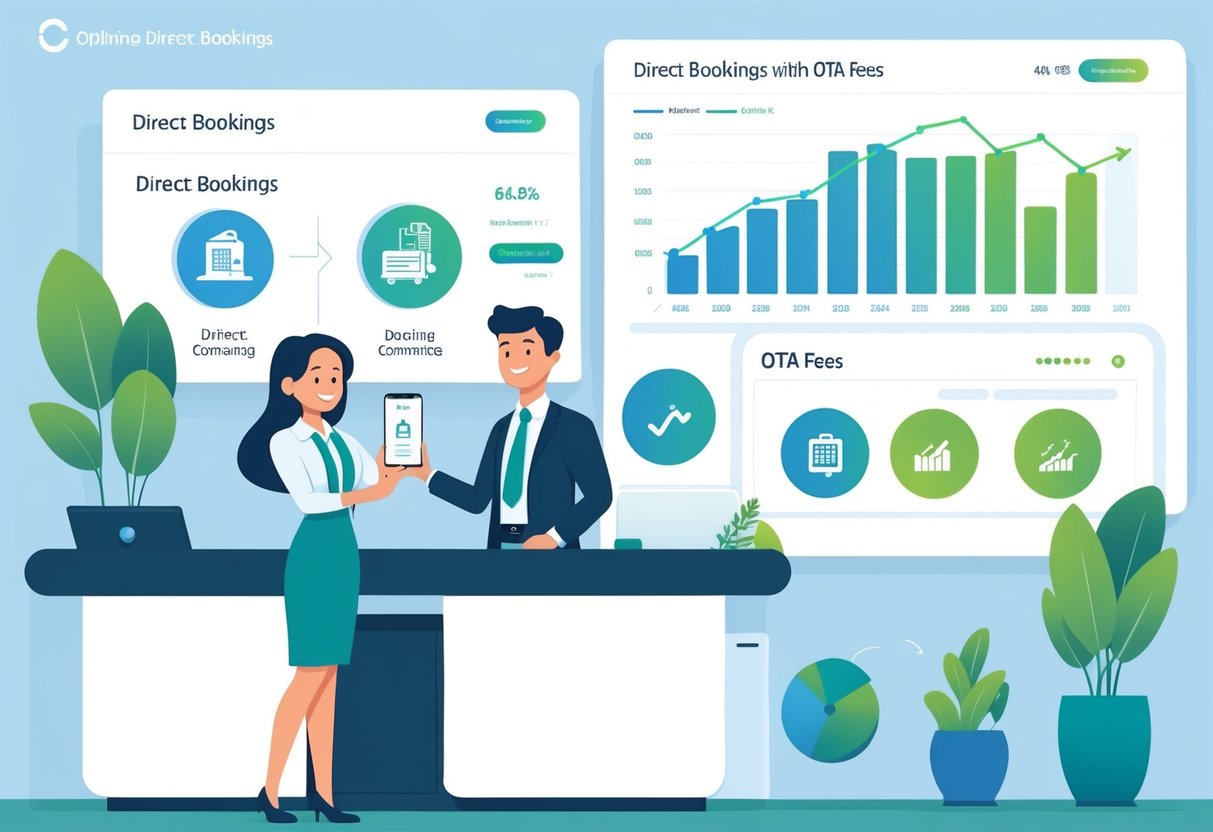


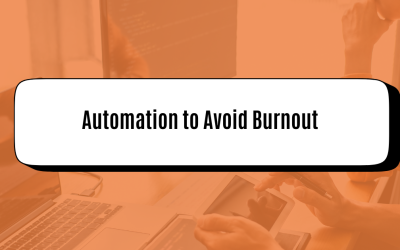
0 Comments